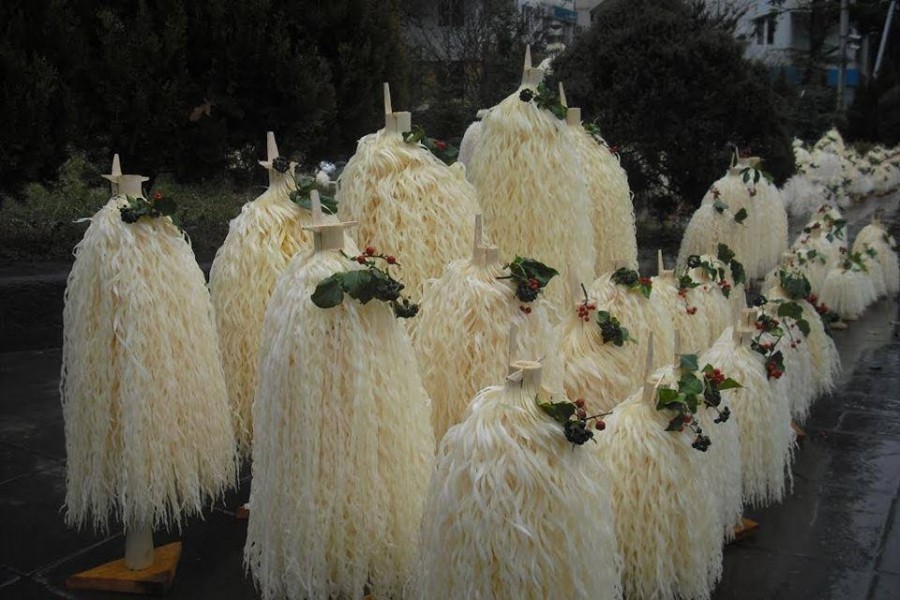How to Do New Year’s Holiday Like a Georgian
New Year’s time in Georgia is quite distinguished from any other countries. First of all, it feels infinite and the reasons or excuses to celebrate never runs out. You’ll be surprised to learn that we switch to holiday mood starting from December 17th- Saint Barbare’s day, followed by St. Nicholas day (December 19th) and it lasts until January 19th Epiphany day, for some maybe even longer.
In the Republic of Georgia, Christmas celebrations contain plenty of familiar elements, as well as a number of traditions that are uniquely Georgian. Christmas trees are an important part of Georgian Christmas, as well. Georgian Christmas trees, called Chichilaki, are carved from the branches of walnut trees. More familiar Christmas concepts have a place in Georgian festivities. Santa claus, known as Tovlis Papa, which means Grandfather Snow is wearing traditional Georgian clothes and a fur called a Nabadi.
A taste of Georgia during New Years is very rich and full of walnuts flavor: Churchkhela traditional Georgian candle-shaped candy, the main ingredients are grape must, nuts and flour; Satsivi is a food paste in Georgian cuisine made primarily from walnuts; Gozinaqi is a traditional Georgian confection made of caramelized nuts, usually walnuts, fried in honey, and is served exclusively on New Year’s Eve and Christmas, so one should grab the chance to try it.
Here you find a small guide of dates, which can often be confusing:
December 24th/25th
December 25th is a normal calendar day in Georgia. Orthodox calendar celebrates Christmas on January 6/7. Although, there is a modern tendency for restaurant and bars business to host Christmas eve on this day. As we’ve already mentioned, it’s a good reason to celebrate Christmas twice an year and have a proper hangover excuse at work next day.


December 31th/ January 1st
Even though, January 1st is not a New Year according to the Julian Calendar, it was hard ro avoid being festive while vast majority of the world celebrates. People get their presents on December 31th, and once someone enters your home after midnight, this person is believed to play an important role in family’s next year and define their luck. The first visitor is called Mekvle, he should say kind words before entry, throw candies into a house and step in with a right foot, that’s why Georgians say ‘’he has a good/bad leg’’ in this case. There are some desired people, that everyone begs to be their Mekvle, as they happened to bring some luck to hosts before. As for the next day, It’s a public holiday on January 1st.
January 2nd
Bedoba, meaning Destiny Day is not a religious celebration, although this tradition counts centuries. It is very important to be merry and positive this day, drink moderately and spend the day way you’d like to enjoy the year. Bedoba is also a public holiday and is celebrated twice (January 15th) like other new year holidays.
January 6th-January 7th
Georgia marks Christmas on January 7th according to Julian Calendar. People go to church on January 6th at night for a special liturgy, parish walks around the church three times; While the ones who stayed home, set the candle by the windows which is scenic and don’t miss out!
When Christmas falls, Orthodox Christians of Georgia take part in a religious procession, called “Alilo”. Icons, crosses and banners are carried through the streets and gifts are distributed to the needy. They are dressed in special clothes and costumes. The Alilo procession is named after a traditional Georgian Christmas carol. Songs play an important role in the Christmas tradition in Georgia as well. Harmonious Georgian carols echo through the streets during the procession, and can also be heard in churches throughout the day. Although the songs vary from region to region, Georgian Christmas carols are solemn and beautiful.
January 13th – January 14th
Here it comes New Year’s another eve, one might think that how is it possible to stay energized for celebrating one more New Year’s eve, but as a matter of fact, we set fireworks again, stay awake after midnight, have a fiest and count to 3-2-1 to meet a New year with full of joy.
Bedoba (Destiny Day) is traditionally followed on January 15th and finally on the Georgian Orthodox Epiphany (19th January) we start to settle, Christmas trees must be kept and Chichilakis need to be burnt, this is meant to mark the end of the year’s troubles.


